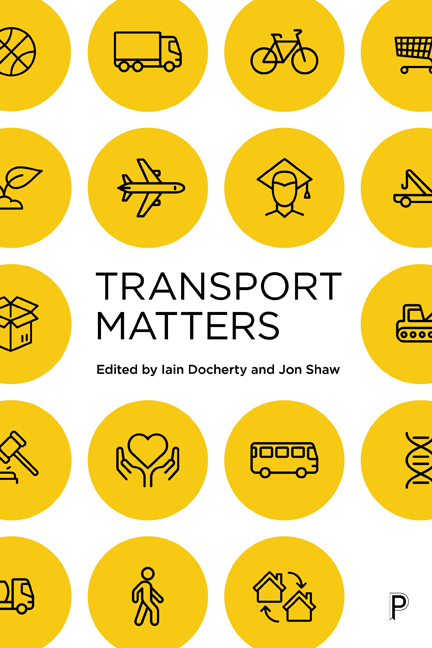15 - Will the ‘Smart Mobility’ Revolution Matter?
Published online by Cambridge University Press: 03 March 2021
Summary
‘Smart Mobility’: the transport sector in transition?
In essence, ‘smart mobility’ is the belief that by significantly increasing the application of computer science technologies in the transport sector, long-term aspirations for more efficient movement of people and goods, with fewer negative consequences, will finally be realised. In this vein, since 2010, there has been a steady stream of publications from global consultancy firms seeking at once to offer an ‘insider's guide’ to a revolution in the transport sector identified as highlylucrative, while showcasing the credentials of key personnel to provide services in that transforming market (for example, Lerner 2011, Graham 2013, Van Audenhove et al 2014, Bouton et al 2015). To this end, Arthur D Little (Lerner 2011) identified ‘niches of potential’ related to 39 ‘key technologies’ and 36 ‘potential urban mobility business models’ which would, by 2050, be contributing to a market forecast to be worth $829 billion per annum. The same firm, in a follow-up publication three years later (Van Audenhove et al 2014: 7), referred to ‘a clear trend’ to ‘Urban Mobility 2.0,’ identifying ‘[i]mperatives to shape extended mobility ecosystems of tomorrow.’ The following year, McKinsey & Co (Bouton et al 2015) titled its offering ‘urban mobility at a tipping point’.
These visions of the future show a high degree of conformity around a global perspective in which the industrialising states are assumed to undergo significant urbanisation and economic growth. Further, they share beliefs in a trend away from traditional transport systems to ‘mobility services’, the latter increasingly combining transport and digital technologies to deliver more personalised and flexible travel options. This integrative platform serves within these visions to underlie a novel mobility ‘ecosystem’, which is foreseen to nurture two technical transitions: i) the shift from internal combustion engines (ICE) powered by liquid carbon fuels to battery electric vehicles (BEVs), and ii) the adoption of road vehicles which are increasingly driven by robotic systems and digitally connected with other road system ‘agents’ in a cooperative way. Moreover, within this new ecosystem, levels of sharing of road vehicles not seen in the industrialised states since prior to mass adoption of the private car are predicted to emerge.
- Type
- Chapter
- Information
- Transport Matters , pp. 349 - 380Publisher: Bristol University PressPrint publication year: 2019



